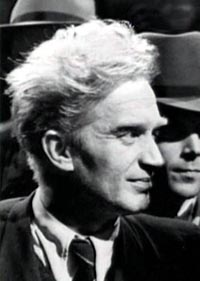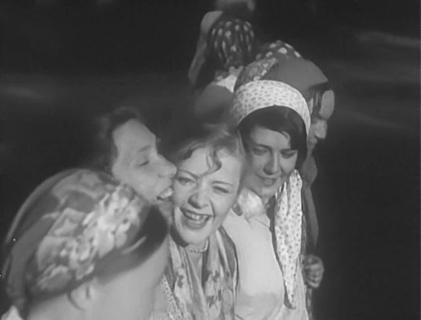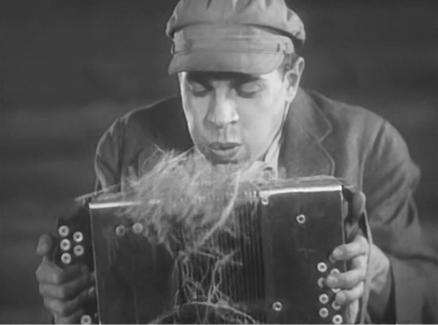The Fourth Annual Cambridge Festival of Ukrainian Film, 2011

On November 10 and 11, 2011, Cambridge Ukrainian Studies, a program in the Department of Slavonic Studies at the University of Cambridge, hosted a symposium to honor the wide-ranging work of Ukrainian filmmaker Ihor (Igor’) Savchenko (1906-1950). Savchenko’s career in cinema spanned several decades and encompassed an assortment of genres; his many credits include the first Soviet musical The Accordion (1934), the romantic comedy Chance Meeting (1936), and the wartime epics Bogdan Khmelnitskii (1941), The Russian Sailor: Ivan Nikulin (1944), and The Third Strike (1948). The Symposium consisted of screenings, discussions, and papers presented by leading international film-specialists that not only illuminated details of Savchenko’s biography and the conditions in which his film-works were made, but also took steps toward situating his extremely varied oeuvre within the broader context of (film-) history.
The following interviews with Emma Widdis and filmmaker Volodymyr Tykhi shed light on the origins of the first international symposium dedicated to the work of Savchenko and its key lines of inquiry and on Tykhyi’s own work.
INTERVIEW WITH EMMA WIDDIS
Rosemari Baker: How did the idea to organize a symposium about The Legacy of Ihor (Igor’) Savchenko come into being? What did the event set out to achieve?
Emma Widdis: Our Department is unique in the United Kingdom in teaching and researching Russian and Ukrainian culture; our Ukrainian studies program (www.cambridgeukrainianstudies.org) offers a vibrant series of cultural events, which reveal the richness of Ukrainian culture to a wide scholarly and non-scholarly audience. With this conference, we sought to bring our Ukrainian researchers together with our specialists in Soviet cinema, and to reveal the complex relationships that underlay cultural production in the Soviet period. Ihor (Igor’) Savchenko – a Ukrainian film- director who was one of the most influential figures in the development of Soviet/Russian cinema – is an ideal object of study for this purpose.
RB: How did you decide which works from Savchenko’s diverse oeuvre were to be shown?
EW: We faced an embarrassment of riches, as there are a great number of tremendous films. In selecting The Accordion and Bogdan Khmelnitskii we sought to reveal the range of Savchenko’s work – from an extraordinary early sung musical (The Accordion of 1934) to the lavish epics of the later period, of which Bogdan Khmelnitskii is the most striking example. In selecting this range, we hoped to encourage discussion not only of thematic and ideological aspects of Savchenko’s work, but also of the extraordinarily high production values of his cinema, of the skill of his work with actors, and of his stylistic range.


RB: In the Symposium’s advertising materials it is mentioned that Savchenko’s “body of work remains little known in the West.” To whom did you intend to introduce these “forgotten” films? What did you wish for the audience to gain from the Symposium’s screenings, papers, and discussions?
EW: The conference, and mini-retrospective, sought to reveal Savchenko’s work to students at all stages, to specialists in world cinema more broadly – and even to specialists in Soviet cinema itself, who too often neglect his work. We sought to place Savchenko in his rightful place alongside the better-known “great” directors of the Soviet period – both in terms of the quality of his own work, and in terms of his extraordinary legacy as a teacher.
RB: What new perspectives did the Symposium open up for researchers?
EW: As above. It revealed the depth and complexity of Savchenko’s work, and its range. It also underlined the importance of a sustained analysis of his legacy as a teacher and mentor for a generation of major Soviet/Russian film-directors – Khutsiev, Paradzhanov, and others (mentioned in publicity).
RB: Initial plans for the Symposium included a discussion and screening with director Marlen Khutsiev, who was, unfortunately, unable to attend. Will his visit to Cambridge be rescheduled for a later date?
EW: We hope that Mr. Khutsiev will visit Cambridge in April.
RB: Which film discussed during the Symposium do you consider to be the most interesting and why?
EW: Personally I gained much from the study and discussion of the 1936 comedy, Chance Meeting. This film, produced in the same year as Grigorii Aleksandrov’s Circus, Alexander Medvedkin’s Miracle Worker, and Abram Room’s Severe Youth, extends our understanding of that most complex of periods, and of the evolution of the Soviet comic genre. It also prompts us to look in particular at the significance of work produced in Ukraine, by Ukrainian filmmakers at this time, and to explore what was described by contemporary critics at the time as the “Ukrainian baroque.”
RB: What is the next event to be arranged by the Department of Slavonic Studies?
EW: During this term, we will have a series of talks dedicated to the theme of Performance in Russian culture, including a lecture by Tim Scholl on Soviet ballet, and a visit from a member of the teatr.doc theatre company. In September, we will be organizing a major international symposium on Interdisciplinarity and Collaboration in the Russian and Soviet Avant-garde.
INTERVIEW WITH VOLODYMYR TYKHI
Rosemari Baker: How did you come to work in the film industry?
Volodymyr Tykhi: I was born and grew up in the West of Ukraine, in the Lviv region. Television from Poland, which is admirably distinguished by its progressive character, was broadcast there (unlike in the remaining territory of the former USSR). Between the ages of ten and fifteen, I managed to watch all the classics of European and American cinematography that were banned in the Soviet Union (New Wave, post-modernism, surrealism, etc.). It was such an intense and striking experience, especially when compared to the grey, everyday life of the ‘80s in the USSR. And I never entertained the possibility that I could become anything else other than a cinematographer. My family is far removed from the worlds of creativity and cinema… But, in any case, after I’d grown up, to the surprise of all my relatives, I decided to enter film-school. And I entered. This simply astounded my relatives. This was at the start of the ‘90s. The Collapse of the Soviet Union. The Declaration of Independence of Ukraine.
RB: So you were strongly influenced by foreign cinema? Which elements of these films did you want to introduce into Ukrainian cinema?
VT: Yes, I was strongly influenced by foreign cinema… It was namely thanks to this influence that I came into cinema. What impressed me first and foremost about foreign cinema was its very approach – the artistic analysis that lay at the heart of practically all the films that I’d seen. The story was drawn straight from the main hero’s personality, and not from ideological tasks supplied by the government and Party. But I wasn’t just influenced by foreign films. The Poles showed banned Soviet films. Paradzhanov, Tarkovsky.
RB: How did you find watching these films?
VT: I found it much more difficult to watch Socialist Realist films, where a feeling of truth was entirely absent. Shall we move on to the next question?
RB: Of course. Why did you choose to work in the short-film format?
VT: The choice […] was primarily dictated by the necessities of production. You can appreciate that shooting a short film is feasible in just a few days. Literally in the format of a “happening.” Also, a big virtue of short films is that it’s completely feasible to produce them and to be engaged in different commercial activities at the same time – shooting adverts and so on, so as not to slip into debt. This affects all the participants in our project. Unfortunately, commercial film production in the Ukraine isn’t possible at the present time owing to the all-out piracy of DVDs and an insufficient number of cinemas. The idea arose to create an almanac of short, no-budget films, with zero financial risk and a shared subject matter. The choice of subject matter for Jerks – Arabesques (Tykhyi’s previous film-project, released in 2010 – R.B.) was made in response to the dominance of post-Soviet TV productions, which were pseudo-artistic and deprived of any sort of cultural or social realia; alternatives to these productions simply did not exist. The choice of theme for the next almanac, Ukraine, Goodbye!, was a more intelligent one. Jerks – Arabesques was more of a fixation of reality than a reflection of it. In the new project, we’re trying to define comprehensive reasons for the socio-cultural problems of modern-day Ukraine.
RB: Do you think that the project has been successful? Are you satisfied with the result?
VT: I’m confident that the project is successful. It just remains for the Ukrainian public to be convinced. It’s still too early to talk about a result. We have about fifteen films in production and our expectations are very optimistic. But we’ll only be able to talk about a real result in a year’s time, when the almanac goesout on general release. It’s still too early to judge whether or not we’ve achieved a serious social resonance.
RB: Have you shown your films in the Ukraine or only at film-festivals abroad?
VT: Officially, we haven’t shown the films in the Ukraine… but there were internal viewings for creative discussions.
RB: What were your impressions of Cambridge?
VT: First, I really liked Cambridge. Secondly, I was impressed by the festival’s audience, and I liked the festival’s organisation. It was very interesting and useful to answer questions from viewers once they’d seen the films. Visiting Cambridge allowed me to view the project Ukraine, Goodbye! as a cultural event.
RB: Does Cambridge’s Ukrainian film-festival differ from other festivals in which you’ve taken part?
VT: Primarily the Cambridge festival differs in its absence of “officialism” (ofitsioz). Practically all film-festivals are “vanity fairs” in one way or another. At Cambridge there isn’t an agenda to pick a best film, a best author…
That said, it’s hard to find a more sophisticated viewing audience than an audience in Cambridge.
RB: What do you plan to do next?
VT: At present, substantial work is underway on my full-length film The Green Jacket. It’s a drama with elements of a thriller; the main heroine is a teenage girl who’s lost her younger brother and is trying to rid herself of a terrible guilt complex. The actors and locations have been selected and preparations are in full swing. I’m hoping that shooting will start at the end of spring.

.jpg)



